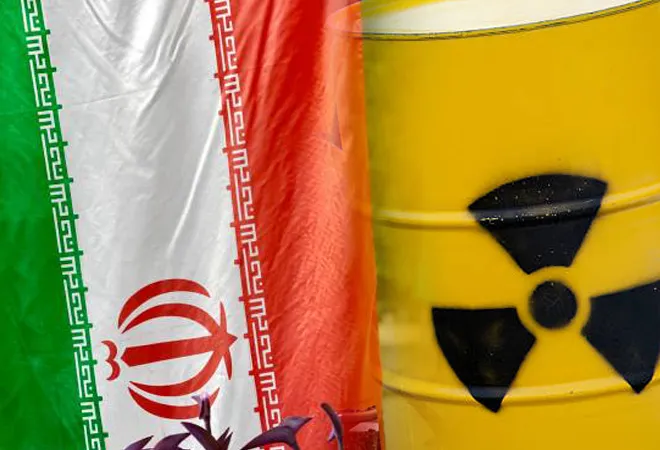-
CENTRES
Progammes & Centres
Location
What will be the future of the Iran–US relationship and Iran's position on the international stage if Iran's nuclear talks reach an impasse?

The revival of the Iran nuclear deal, known formally as the Joint Comprehensive Plan of Action (JCPOA), has proven more arduous than what many of its proponents expected and its opponents feared. Long-running conflict over Iran’s nuclear programme may reach a point of no return in the coming months, as Tehran’s increasing stockpiles of uranium enriched to near-weapons grade. Iran is only weeks away from enriching uranium to 90 percent and has also begun installing advanced centrifuges in a cluster at an underground enrichment plant. However, enriching uranium to 60 percent and approaching the ‘breakout’ point doesn’t necessarily mean that Tehran has given up on the nuclear deal. While a deal is still possible, the likely scenario is the breakdown of talks which might give way to more escalation as Iran and the United States follow their narrow interests and respective no-deal strategies.
The US and its European allies submitted a draft resolution to the UN nuclear watchdog, the Board of Governors, against Iran’s nuclear programme, believing that a resolution is the best way to address outstanding safeguards issues.
Iran’s decision on 9 June to remove 27 surveillance cameras in response to the US-backed resolution by the International Atomic Energy Agency (IAEA) could be recognised as a major setback for stalled talks to revive the JCPOA. The US and its European allies submitted a draft resolution to the UN nuclear watchdog, the Board of Governors, against Iran’s nuclear programme, believing that a resolution is the best way to address outstanding safeguards issues. Rafael Grossi, the Director-General of the IAEA, mentioned Iran’s action as a “fatal blow” to talks over Iran’s tattered nuclear deal with world powers. In contrast, Iranian officials downplayed the resolution that is expected to be adopted by the IAEA Board of Governors against Iran. Mohammad Eslami, the Head of the Atomic Energy Organisation of Iran (AEOI), said the resolution if adopted, will not result in the creation of new conditions. For the time being, sanctions targeting Iran’s Islamic Revolutionary Guard Corps (IRGC) remain the primary obstacle to reaching a deal to return the US and Iran to compliance with the 2015 nuclear deal. Both sides have so far refused to give concessions on the issue, due to domestic political pressure in their respective countries. In the meantime, the question that needs to be answered by all engaged parties, Tehran and Washington in particular, is what will be the alternative to JCPOA if the nuclear talks collapse?
A pragmatic understanding of heavy costs associated with alternatives presents a compliance-for-compliance formula to revive the nuclear deal as the least costly alternative for both Iran and the US, especially considering that the backup options are provocative and risky. The collapse of nuclear talks would have profound consequences, prompting regional tensions and raising the prospect of a military confrontation with Iran. With the talks stalled, pressure is going to increase on the Biden administration from staunch JCPOA opponents to contain Iran’s military. Provoking Tehran risks a launch of pre-emptive attacks on the region’s oil infrastructures at a time when the West is looking for new sources of oil and gas to nullify the dependency on Russian exports. For Iran, the collapse of the deal would cut off billions of dollars in oil revenues, freeze hundreds of billions in funds, and result in further economic penalties. Moreover, the European powers in JCPOA would trigger the snapback provision of the nuclear deal, which would rerun Iran’s nuclear dossier in Chapter VII of the United Nations Security Council. If the talks fail, the US would, therefore, confront the worst-case scenario; either live with a nuclear-threshold Iran or take military action to stop it from coming into being, a cycle of escalation that could spawn military confrontation.
The collapse of nuclear talks would have profound consequences, prompting regional tensions and raising the prospect of a military confrontation with Iran.
For Iran, it seems the US’ plan B already began in late April, which is based on coercive diplomacy, aiming to limit Iran's moves in developing nuclear capabilities. Plan B also relies on political pressure combined with Israeli security provocation. Israel is the main suspect in the five assassinations in Iran that began in May. The US has also used tactical manoeuvring mechanisms in this regard. The launch of the US B-52 and its escort by Israeli F-16s is part of plan B, which is based on a tactical warning against Iran’s nuclear steps. There is a consensus amongst Iranian scholars that this plan would not have the US resort to a full-scale military action as it has a variety of issues to meet post Russia’s invasion of Ukraine. In the meantime, given the US domestic climate and the approach to November congressional elections, the Biden administration will naturally be less willing to give concessions to Iran. It should be noted that Washington faces more critical challenges inside and abroad such as domestic issues, rebuilding its infrastructure, and confrontation with Russia and China, so it is less willing to fully engage with Iran’s issue.
By adopting coercive diplomacy, it seems the Biden administration is preparing to strengthen its own hand to get a better deal by signalling more assertive enforcement of its existing sanctions. As a senior U.S. official points out, Tehran is also expanding its nuclear programmr as “leverage to get a better deal” rather than a dash for the bomb. Now what makes conditions more complicated for Iran is the EU3 (France, Germany, and the United Kingdom (UK) deciding to snap back the UN sanctions and re-impose their own multilateral sanctions. While Tehran hopes that Russia and China would probably oppose such a move at the UN Security Council, many in Iran are worried about the political and economic implications of such measures, believing that snapback will leave no option but withdraw from both the JCPOA and Nuclear Non-Proliferation Treaty (NPT). While escalation toward Iran’s nuclear conflict remains the most likely outcome if diplomacy is failed, changing conditions have also allowed another potential outcome to appear; the JCPOA would collapse, but the parties would pretend that it is still alive to avoid the horrific consequences that its official failure would spur. Trita Parsi, the Executive Vice President of the Quincy Institute, has best described it as a “coma option”.
With the US midterm elections approaching, Washington can no longer give guarantees to Tehran about the IRGC and lifting sanctions. However, for the time being, a temporary plan of action can work for both parties. Iran did not succeed yet in getting a binding commitment that no US administration would again withdraw from the JCPOA and reimpose sanctions. For its part, Iran has made it clear that it has no intention, at least for now, to enrich uranium to 90 percent purity even if the JCPOA talks fail. The US strategy of “maximum pressure” has done nothing but nuclear escalation, intensifying regional security dilemma, and economic deprivation for the Iranian people. Both Iran and the US need to continue negotiations to reach an agreement. Although compromise will be the main necessity for the two parties to reach a balance, there would be no return to the original JCPOA, even if some agreement based on the 2015 deal could be reached.
While Tehran hopes that Russia and China would probably oppose such a move at the UN Security Council, many in Iran are worried about the political and economic implications of such measures, believing that snapback will leave no option but withdraw from both the JCPOA and Nuclear Non-Proliferation Treaty (NPT).
Tehran and Washington waited months to hear a concession from the other side, but neither side has yet made a constructive offer. Failure to reach an agreement on the nuclear deal would result in immense political costs for both the Raisi and Biden administrations, driving unpredictable and uncontrollable tensions in the greater Middle East, and certainly surging oil and gas prices. It also pushes Iran to develop its military ties with China as Tehran faces many challenges in its deterrence policy. On 27 April, Chinese Defense Minister Gen. Wei Fenghe visited Tehran to meet the Iranian Army Chief Maj. Gen. Mohammad Bagheri agreed to step up comprehensive military cooperation. There is no doubt that this upgrade in Sino-Iranian military ties was influenced by the failure of the nuclear talks.
It’s been almost three months since negotiations over the JCPOA stalled. There is also no clear indication of the parties' political willingness to keep talks continue. The Biden administration seems to be playing with time as it knows Iran is facing an economic crisis. It is also very costly for the Raisi administration to retreat from Iran’s demand to delist the IRGC as he would lose the conservative’s political support. The possible move for Iran is leveraging uranium enrichment to 90 percent to bring the US to the negotiating table. The US officials also admit that any alternative to the 2015 nuclear deal is costly and risky in the Middle East. However, both sides are trying to keep the door open for talks while forcing each other to make concessions. Nevertheless, despite all mutual precautions, it seems this “no peace, no war” status could no longer last. If the parties would not come to a mutually agreeable settlement, the tension may reach a point of no return. Consequently, if the talks fail, the following outcomes are inevitable: It will pave the way for the resumption of six UN Security Council resolutions against Tehran and drive the Iranian economy on the verge of collapse which might provoke a humanitarian crisis in the region; provide fertile grounds for Iran–Israel war that will leave no safe zone in the Greater Middle East; exacerbate tensions in Iran–West relations; relations between Iran and Arab states will worsen, and any chance to resolve Iran–Saudi long-standing conflict may fade; and finally, these consequences will add a layer of complexity in arms control and arrangement of the international security post the Russia–Ukraine war.
The views expressed above belong to the author(s). ORF research and analyses now available on Telegram! Click here to access our curated content — blogs, longforms and interviews.

Vali Golmohammadi Ph.D. is an Assistant Professor at Tarbiat Modares University Department of International Relations Tehran and a visiting scholar at Bilkent University Ankara Turkey. ...
Read More +